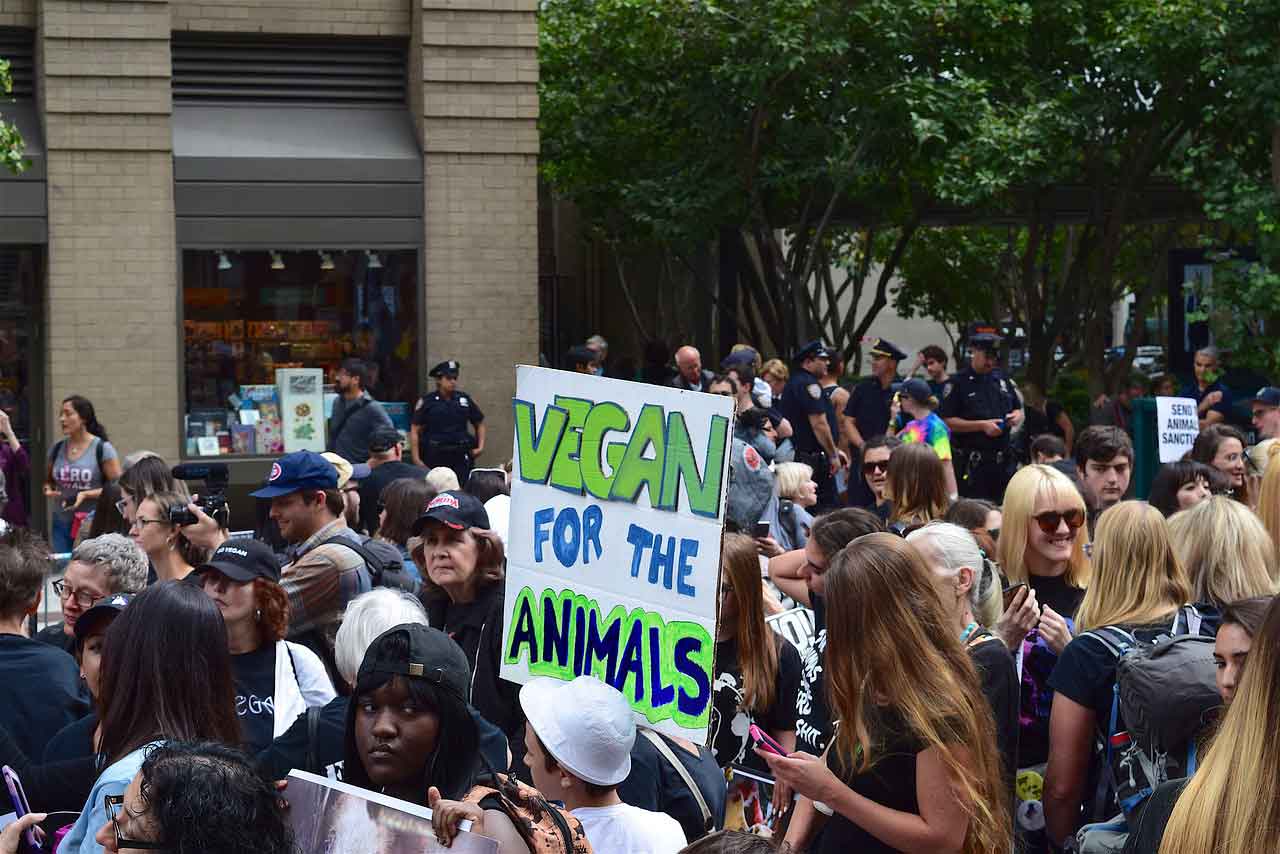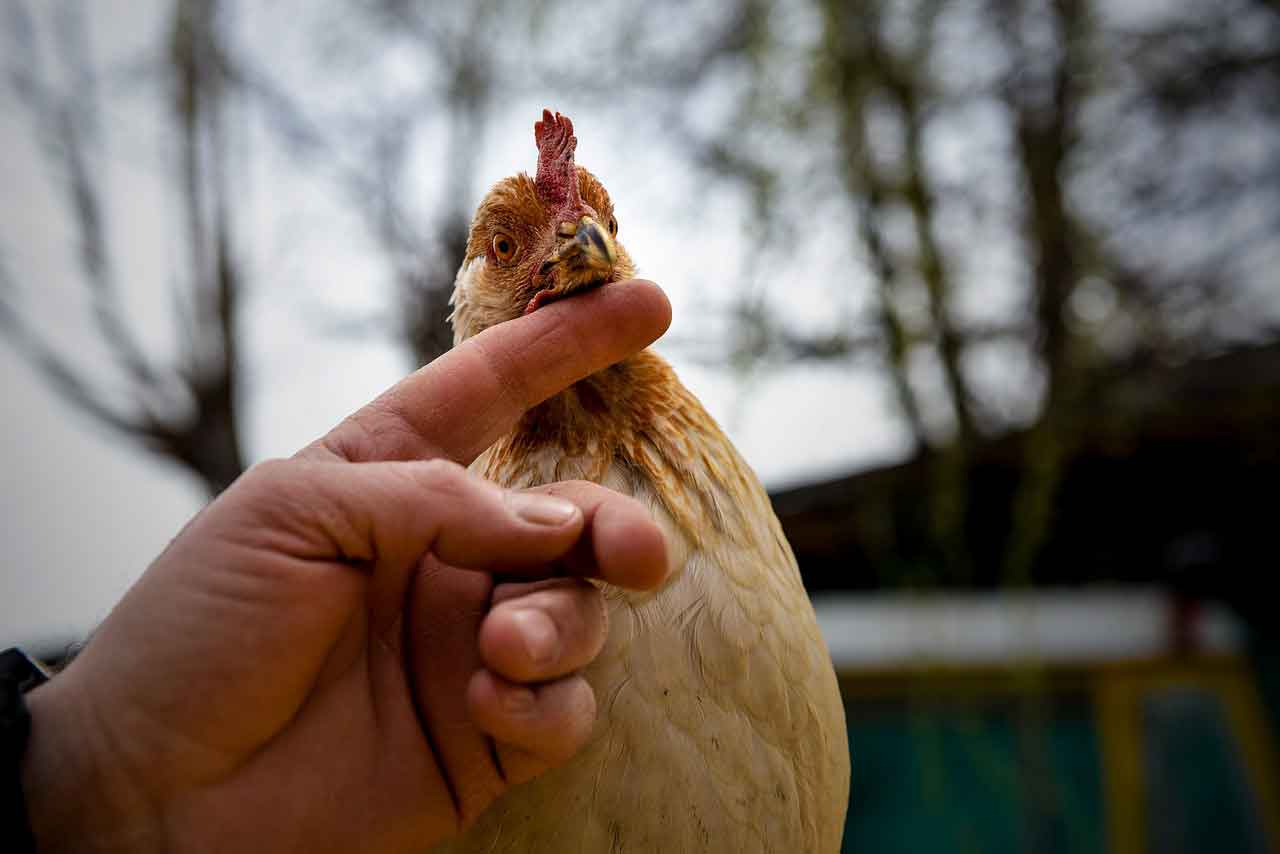Loving Animals, Eating Meat!
By: Grazyna Witkowska
Date: 10th April 2019


Are vegans the only people who truly love animals?
I remember seeing a documentary from the UK about farming chickens. That was more than 25 years ago. The documentary made me stop eating chicken ‘cold turkey’ but more importantly I never forgot the distress on the face of a farmer who was talking about the plight of his chickens. He explained that as long as the majority of farmers farm in this inhumane way, he cannot make a living and farm with the right welfare for his chickens. He pleaded to the camera for the government to change the regulations so it could be possible to be sensitive to the animal needs while staying competitive as a food producer.
So it’s not only vegans who care about animals and animal welfare…
But it was vegans who made headline on Australian television yesterday. Vegans protesting were shown even before the story about a serial killer roaming at large! Good on you Vegans for bringing to our attention the need to be aware how our meat is produced even if the government, rather than proactively reviewing existing animal welfare laws, keeps bringing new laws to silence anyone who would dare to disseminate the true facts about our food production.
Personally, I am ok accepting meat eating. I just do not want to be a part of the way animals are currently farmed and slaughtered.
A few points I’d like to share for your consideration in the context of “Loving Animals… Eating meat”:
(1) Gratitude
What happened to having an attitude of gratitude and reverence? The ways of gratitude and ritual of thanksgiving for food that sustains us?
 There are many sources that talk about that kind of respect that people who lived in harmony with other life forms had. An example I’d like to bring forth here is the description in the book “Wisdom of the Elders” by Peter Knudtson and David Suzuki authors explain that in the old tradition when the Wintu Indians from North-Central California hunted a deer they would use every part of the animal “not because they believed in the intrinsic virtue of thrift, but because the deer had died for them”.
There are many sources that talk about that kind of respect that people who lived in harmony with other life forms had. An example I’d like to bring forth here is the description in the book “Wisdom of the Elders” by Peter Knudtson and David Suzuki authors explain that in the old tradition when the Wintu Indians from North-Central California hunted a deer they would use every part of the animal “not because they believed in the intrinsic virtue of thrift, but because the deer had died for them”.
(2) Dignity
We talk about dignity for animals… And what about the dignity for the farmers?
Imagine yourself having to witness every day the suffering of sentient animals and yet promulgating this status quo. Sure, a farmer or a farm worker might feel they have no other choice to feed their families… but does that make them feel good about themselves, does that make them feel like exceptional human beings? So when they grow callous, when kicking a pig to make him move more quickly, or picking up dead bodies of chickens that drowned in their own excrement no longer creates repugnance – do you think this person is truly happy?
And if we define ‘dignity’ as ‘the state or quality of being worthy of honour or respect’ – do you think a person who has to endure all that would feel like they have any dignity left?
Therefore, I’d say, increasing animals’ welfare will increase farmers welfare!
(3) Transparency
The way animals are raised for food in Australia today is greatly shrouded in secrecy. When animal activists put footage of how animals are treated (either during their day-to-day lives, in transit, or in slaughter houses) the agriculture industry and the government get a hissy fit. And yet, I do want to make my own decisions what I eat. We have compulsory labelling of food so I can actually read what I am buying in a jar. In Europe, after the ‘mad-cow’ epidemic inroads have been made to know the origin of the meat to be consumed. In fact with our current technology we could trace every morsel of meat to a particular animal on a particular farm – if we wanted.
I bet, if we knew how much violence and suffering went into our meat production half of the population would turn vegan overnight.
(4) Health
So we know we need to eat protein. Great. Most vegetables have protein. Yes meat has the highest protein content… but have you recently reflected what you actually get when you buy meat?
Take for example chicken. If you’re old enough to remember what chicken breast looked like in the seventies then you know that chicken breast now-a-days is about 3 times as big. And you probably know that the chickens used to produce meat are broilers, genetically developed to put on weight super fast. So fast that they can easily break their legs because the bulk of their bodies cannot be supported by the young, growing bones. Those chickens are put to death at the age of 3 months and they are already ginormous. If those chickens were allowed to live a little longer they would soon die of heart attack because their hearts could not pump the blood effectively through their humongous bodies.
So we are no longer eating chickens – we are eating some Frankenstein creations, little monsters.
And if eating monsters is not off-putting enough for you then consider what they are fed. Even if they fed ethically with the food that chickens are meant to eat (which is not always and everywhere the case). Part of their grain will be corn and 95% of corn world-wide is genetically modified. So if you are buying GMO free produce but eating ‘normal’ chicken – then you are indirectly probably eating the GMO corn.
(5) What about plants?
We know animals can feel, think, plan, use tools…not to mention that many of them are absolutely beautiful to look at and able to form deep friendships not only with other members of their own species but also with other specie including humans. So – understandably – many humans would like to spare the lives of animals. But what about plants? As we research and understand more about the intelligence of plants, their ability to feel, collaborate, communicate, support their own genetic family members, protect themselves from animals and protect themselves by enlisting the help of animals…
So, how should we feel about eating plants?
Yes, we can become fruitarians… or breatharians. But, seriously, this is an issue that even vegans need to resolve for themselves if they are to make truly conscious choices about the way we live.
(6) Cost
 The common argument used to advocate keeping the status quo – even if it is evidently cruel and inequitable – is that in order to provide food to growing population necessitates mass production that is inevitably cruel but there is no alternative.
The common argument used to advocate keeping the status quo – even if it is evidently cruel and inequitable – is that in order to provide food to growing population necessitates mass production that is inevitably cruel but there is no alternative.
And for starters this argument is totally unscientific. I know of no study that was able to demonstrate that conclusion while I have seen many studies where plant-based diet was shown to feed more people and create less pollution.
But be it as it may, if we started from reducing food waste (which is horrendous in our ‘modern’ world) then we will be moving towards reducing the cost of food.
And after all, people are the fountains of creativity so let’s figure this out and make it happen in a way that’s gentle on humans, animals and environment.
How do you feel about this topic? Are you particular about what you choose to eat?- Why? Would you prefer to stick with the status-quo? – Why?
I have learned that everyone deep down has a personal ‘set of scales’ that tell them whether they are truly ok with something or not.
Let me end with another story…
The day after an evening of flicking semi-friendly arguments between vegans and non-vegans, a friend of mine asked me for an opportunity to explain differently why she was a vegan. I agreed.
She said to me: ask me whether I would eat a cow, a fish, a carrot.
I asked: “Would you eat a cow?”
“No.” was a quick reply.
“Would you eat a fish?”
“No.” she answered equally quickly.
“Would you eat a carrot?”
“Yes” she said and then added “And now let me ask you 3 questions.” And so she asked:
“Would you eat a cow?”
“Yes”
“Would you eat a fish?”
“Yes”
“Would you eat a koala?”
“No!” I retorted slightly nauseous – how could one even ask such a question?
“That” – she continued – “is why I am a vegan.”
And it was suddenly crystal clear to me how individually personal are our choices – especially about such a visceral thing as food. So I stopped expecting people to follow any particular path of thinking or even to be consistent with their preferences – because as humans, we are very inconsistent.
And having said that, I want to add that we humans also evolve every day – or at least are able to evolve. As we learn more facts from diverse sources, get in contact with our emotions, and interact with others (of any species) – we create ourselves anew into better and better versions of ourselves. (And to me this is super satisfying!) And as we evolve, by our mere presence we are influencing the world to evolve into better and better version of self.
Share your views with us! Every view is very welcomed. In fact, every view is enriching. Every view is an opportunity to test and reveal our own deepest truths.
Join us in our Meet-Up discussion on the 15 April, have your say, influence the world! link

Grażyna Witkowska - Kinesiology and Hypnosis
Copyright @2018 - Best Versions Of Us - Developed by BWebSeen
